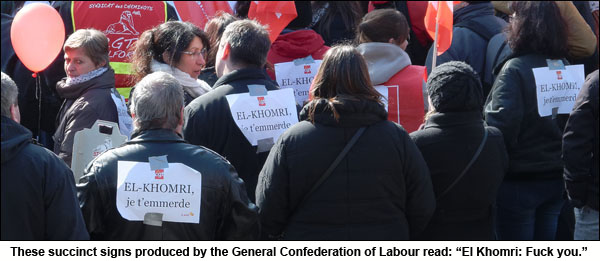OPINION
French workers’ struggle against El Khomri law all too familiar
By DAVID GROVES
(June 14, 2016) — If you’re wondering what France’s El Khomri law is, and why it has inspired rolling national strikes that have the nation’s garbage and resentment piling up, all you really need to know is this. Its supporters promise these labor reforms will create jobs by giving employers more flexibility.
In modern corporate parlance, “flexibility” means working-class people had better bend over.
This year, Prime Minister Manuel Valls and his cohorts drafted a sweeping set of reforms, named after Labour Minister Mariam El Khomri. This El Khomri law, actually a proposal, would make it easier for companies to lay off workers, cut overtime payments for hours worked beyond France’s statutory 35-hour workweek, reduce unemployment benefits, and weaken some union powers.
The proposal was immediately met with vocal opposition, protests and strikes.

Unions and working-class people, who had worked to narrowly elect Valls’ French Socialist Party over the right-wing conservative incumbents a few years ago, feel betrayed. As it turns out, this Socialist Party does not represent the nation’s political left. It purports to be moderate and centrist. Left-leaning, but pro-business. Sound familiar?
In the past, Valls has defined himself as “Blairiste” or “Clintonien.” His chosen Minister of the Economy is a former investment banker who recently told an angry citizen that the way to get a nice suit like his is “to work.”
 The El Khomri law also inspired the formation of Nuit Debout — Up All Night, or “Night, Standing Up” — a spontaneous youth-led movement sympathetic to the unions’ cause that began meeting en masse (as in this photo in Paris’ Place de la République) to highlight issues of income inequality and discuss progressive solutions. Also sound familiar?
The El Khomri law also inspired the formation of Nuit Debout — Up All Night, or “Night, Standing Up” — a spontaneous youth-led movement sympathetic to the unions’ cause that began meeting en masse (as in this photo in Paris’ Place de la République) to highlight issues of income inequality and discuss progressive solutions. Also sound familiar?
In the face of growing unrest and opposition, Prime Minister Valis announced last month that the El Khomri law would bypass Parliament’s lower house without a vote. Yes, apparently he can do that. Instead, it was to be debated in the more conservative Senate.
Since then, major strikes across several industries — by pilots, sanitation workers, transit operators, and many others — have disrupted services throughout the country in the days leading up to the Senate debate that began on Monday.
Today, a massive demonstration against the El Khomri law is planned.
 “The El Khomri law is an attack on French workers’ standard of living, a quality of life that is an inspiration to the rest of us fighting for worker dignity,” wrote Nicole Grant, Executive Secretary-Treasurer of the M.L. King County Labor Council, AFL-CIO, in a letter of solidarity sent last week to French union leaders:
“The El Khomri law is an attack on French workers’ standard of living, a quality of life that is an inspiration to the rest of us fighting for worker dignity,” wrote Nicole Grant, Executive Secretary-Treasurer of the M.L. King County Labor Council, AFL-CIO, in a letter of solidarity sent last week to French union leaders:
“In Seattle, we are striving for a better life, fighting over issues that workers in many countries take for granted, like paid parental leave, fair scheduling, community workforce agreements, and enforcement of our hard-won labor standards. As we ourselves seek gains, it is heartening to see unions in France preserving what you have gained.”
Both the French government and the unions vow that they won’t back down. But, like their counterparts in the United States, unions in France have been weakened by a decades-long drift toward globalization. “Free trade” policies have made it easier to shift production and jobs away from nations with strong labor standards. And, just like here in America, this is decimating France’s middle class and resulting in widening income inequality.
As former Le Monde editor Sylvain Cypel explained in a New York Times column, “Why French workers are so mad:”
The current round of strikes will probably come to an end soon. And Nuit Debout has already largely disintegrated. But its American cousin Occupy Wall Street left a legacy, the idea of the “1 percent” and of the noxiousness of ever-growing social inequalities. What’s going on in France now is similarly clarifying trends: To work in the future, you’ll have to settle for being less well paid, and for having worse health insurance and lower unemployment benefits. As for your children, they’ll live in a world with much greater inequality than yours. That’s the new rule.
David Groves is Editor of The Stand.





